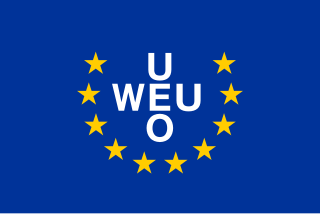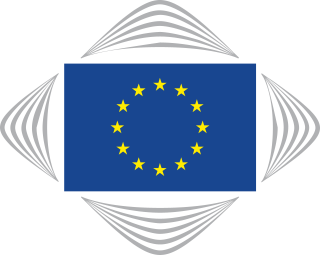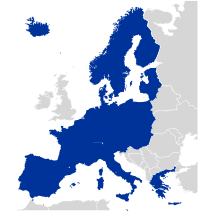
The European Commission (EC) is the executive of the European Union (EU). It operates as a cabinet government, with 27 members of the Commission headed by a President. It includes an administrative body of about 32,000 European civil servants. The Commission is divided into departments known as Directorates-General (DGs) that can be likened to departments or ministries each headed by a Director-General who is responsible to a Commissioner.

The Western European Union was the international organisation and military alliance that succeeded the Western Union (WU) after the 1954 amendment of the 1948 Treaty of Brussels. The WEU implemented the Modified Brussels Treaty. During the Cold War, the Western Bloc included the WEU member states and the United States and Canada as part of the North Atlantic Treaty Organization (NATO).

The European Committee of the Regions (CoR) is the European Union's (EU) assembly of local and regional representatives that provides sub-national authorities with a direct voice within the EU's institutional framework.

The European Economic and Social Committee (EESC) is a consultative body of the European Union (EU) established in 1958. It is an advisory assembly composed of "social partners", namely: employers, employees and representatives of various other interests. Its seat, which it shares with the Committee of the Regions, is the Jacques Delors building on Belliardstraat / Rue Belliard 99 in Brussels. Once known by the acronym "EcoSoc", the body is now referred to as the "EESC", to avoid confusions with the United Nations ECOSOC.

The Common Foreign and Security Policy (CFSP) is the organised, agreed foreign policy of the European Union (EU) for mainly security and defence diplomacy and actions. CFSP deals only with a specific part of the EU's external relations, which domains include mainly Trade and Commercial Policy and other areas such as funding to third countries, etc. Decisions require unanimity among member states in the Council of the European Union, but once agreed, certain aspects can be further decided by qualified majority voting. Foreign policy is chaired and represented by the EU's High Representative, currently Josep Borrell.
A supranational union is a type of international organization that is empowered to directly exercise some of the powers and functions otherwise reserved to states. A supranational organization involves a greater transfer of or limitation of state sovereignty than other kinds of international organizations.

The Common Security and Defence Policy (CSDP) is the European Union's (EU) course of action in the fields of defence and crisis management, and a main component of the EU's Common Foreign and Security Policy (CFSP).

The Directorate-General for European Civil Protection and Humanitarian Aid Operations, formerly known as the European Community Humanitarian Aid Office, is the European Commission's department for overseas humanitarian aid and for civil protection. It aims to save and preserve life, prevent and alleviate human suffering and safeguard the integrity and dignity of populations affected by natural disasters and man-made crises. Since September 2019, Janez Lenarčič is serving as Commissioner for Crisis Management in the Von der Leyen Commission.

The European Trade Union Confederation (ETUC) is the major trade union organisation representing workers at the European level. In its role as a European social partner, the ETUC works both in a consulting role with the European Commission and negotiates agreements and work programmes with European employers. It coordinates the national and sectoral policies of its affiliates on social and economic matters, particularly in the framework of the EU institutional processes, including European economic governance and the EU Semester.

European Union culture policies aim to address and promote the cultural dimension of European integration through relevant legislation and government funding. These policies support the development of cultural activity, education or research conducted by private companies, NGO's and individual initiatives based in the EU working in the fields of cinema and audiovisual, publishing, music and crafts.

The European Structural and Investment Funds are financial tools governed by a common rulebook, set up to implement the regional policy of the European Union, as well as the structural policy pillars of the Common Agricultural Policy and the Common Fisheries Policy. They aim to reduce regional disparities in income, wealth and opportunities. Europe's poorer regions receive most of the support, but all European regions are eligible for funding under the policy's various funds and programmes. The current Regional Policy framework is set for a period of seven years, from 2021 to 2027.

The European Research Area (ERA) is a system of scientific research programs integrating the scientific resources of the European Union (EU). Since its inception in 2000, the structure has been concentrated on European cooperation in the fields of medical, environmental, industrial, and socioeconomic research. The ERA can be likened to a research and innovation equivalent of the European "common market" for goods and services. Its purpose is to increase the competitiveness of European research institutions by bringing them together and encouraging a more inclusive way of work, similar to what already exists among institutions in North America and Japan. Increased mobility of knowledge workers and deepened multilateral cooperation among research institutions among the member states of the European Union are central goals of the ERA.

The Directorate-General for International Partnerships is one of the departments of the European Commission. It operates under the authority of the European Commissioner for International Partnerships, Jutta Urpilainen.
The North–South Centre, officially the European Centre for Global Interdependence and Solidarity, is a Partial Agreement — of the Council of Europe, the oldest political organisation of European states.

The Treaty of Lisbon is an international agreement that amends the two treaties which form the constitutional basis of the European Union (EU). The Treaty of Lisbon, which was signed by the EU member states on 13 December 2007, entered into force on 1 December 2009. It amends the Maastricht Treaty (1992), known in updated form as the Treaty on European Union (2007) or TEU, as well as the Treaty of Rome (1957), known in updated form as the Treaty on the Functioning of the European Union (2007) or TFEU. It also amends the attached treaty protocols as well as the Treaty establishing the European Atomic Energy Community (EURATOM).
Health-EU portal is an official web portal of the Health and Consumers Directorate-General that facilities the access of public-related health information to European Union citizens.

The area of freedom, security and justice (AFSJ) is a collection of justice as well as migration & home affairs policies designed to ensure security, rights and free movement within the European Union (EU). Areas covered include the harmonisation of private international law, extradition arrangements between member states, policies on internal and external border controls, common travel visa, immigration and asylum policies and police and judicial cooperation.

Lobbying in the European Union, also referred to officially as European interest representation, is the activity of representatives of diverse interest groups or lobbies who attempt to influence the executive and legislative authorities of the European Union through public relations or public affairs work. The Treaty of Lisbon introduced a new dimension of lobbying at the European level that is different from most national lobbying. At the national level, lobbying is more a matter of personal and informal relations between the officials of national authorities, but lobbying at the European Union level is increasingly a part of the political decision-making process and thus part of the legislative process. 'European interest representation' is part of a new participatory democracy within the European Union. The first step towards specialised regulation of lobbying in the European Union was a Written Question tabled by Alman Metten, in 1989. In 1991, Marc Galle, Chairman of the Committee on the Rules of Procedure, the Verification of Credentials and Immunities, was appointed to submit proposals for a Code of conduct and a register of lobbyists. Today lobbying in the European Union is an integral and important part of decision-making in the EU. From year to year lobbying regulation in the EU is constantly improving and the number of lobbyists is increasing.

This article outlines the present structure of the European Union's Common Security and Defence Policy (CSDP), a part of the Common Foreign and Security Policy (CFSP) based on articles 42–46 of the Treaty on European Union (TEU). Article 42.2 of TEU states that the CSDP includes the 'progressive framing' of a common Union defence policy, and will lead to a common defence, when the European Council of national heads of state or government, acting unanimously, so decides.
Participatory democracy "is founded on the direct action of citizens who exercise some power and decide issues affecting their lives". Participatory democracy refers to mechanisms through which citizens are involved in public decision-making processes, not as an alternative to representative democracy but as a complement to it.















